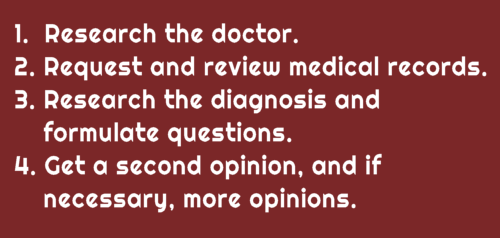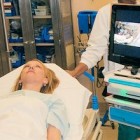On Friday, Dr. Farid Fata was sentenced to 45 years in prison in the state of Michigan.
If you read or watch the news reports you would think the reason behind his long sentence had something to do with the fact that he had diagnosed 500+ people with cancer they didn’t really have, told them they needed chemo, then treated them for those cancers they didn’t have. As a result many died, some will deal with the aftermaths of unneeded chemo for the rest of their lives, some are ruined financially in medical debt, and worse.
The headlines read things like,
Farid Fata, Doctor Who Gave Chemo to Healthy Patients, Sentenced to 45 Years in Prison
Doc Told Hundreds of Healthy People They Had Cancer
He did do those things. Horrible, cruel, heinous crimes against those victims and society that hit way too close to home for me. He is a despicable human being and deserves many more than 45 years in prison, in my not-so-humble opinion.
But here’s what most of us are missing:
Fata wasn’t found guilty, nor will be be imprisoned, because any of those people suffered. He isn’t paying the price for anything related to the heartbreak, fear, mental or emotional anguish he put those patients and their families through. His legal-guilt has nothing – NOTHING – to do with the physical, mental or emotional horrors of his crime.
No. Instead he is going to prison because he defrauded the government and Blue Cross-Blue Shield out of money. His crimes were money crimes. According to CNN, “He pleaded guilty to 13 counts of Medicare fraud, one count of conspiracy to pay or receive kickbacks and two counts of money laundering.” According to the Detroit News, the amounts total $34 million.
Could Fata have been stopped> Yes, he most certainly could have.
In fact, I will go out on a limb and say that all 553 patients could have avoided what happened to them. Every one of them could have gotten the care they needed, and avoided the care they did not need ……If they had a patient advocate who was paying attention, an advocate would would have taken some or all of these important steps:
?1. Research this monster to uncover his track record. It took me about 2 minutes to learn that Fata has a long and storied history of malpractice going back at least to 2009 – four years before his first arrest for fraud. An advocate could have uncovered this information in the state databases that hold such information. (That information is now replaced in Michigan’s database with “license revoked.”)
2. Request, and review, the patient’s medical records. Many of the news stories cite the fact that Fata lied to his patients about their cancer / blood test results. But the results are the results. If no cancer is detected, the paperwork can’t lie.It can be incorrect. It may need to be done again, but what’s in the blood is in the blood. That can’t change. (This is exactly how I figured out I had been misdiagnosed. It was my own review of my own test results that led me to begin asking questions about my diagnosis.)
3. Research the diagnoses provided by Fata. There is enough information online that everyone of those diagnoses would have been disproved – every one. With the test results in hand, and symptoms research, enough information would have been obvious to an advocate to suggest that more questions needed to be asked. Asking those questions would have led to a more accurate diagnosis.
4. Most obvious of all – a patient advocate would never consider allowing his or her client to undergo chemotherapy (or any other difficult therapy) without being sure the client had obtained at least a second opinion, and possibly more opinions if necessary. This is the part that is most appalling to me. Why didn’t any of these patients seek second opinions prior to beginning their chemo?
Do not (and I repeat – do not!) take any of this as the casting of aspersions on the patients and families who suffered. They have done nothing more than to trust a doctor they thought was trustworthy, assuming (uh-huh) he would never suggest they had a disease, or needed treatment, that was not appropriate. They are innocent victims of a monster who can never repay to them what they have lost.
I bring this to your attention to say that patients NEED advocates. Patients NEED someone who is looking out for them. Patients NEED someone who can ask the right questions and get the right answers so the patient can get exactly what they need from the system – not one thing more or one thing less. Patients need someone to help them make sure their trust is well placed.
So how can you, the advocate, use this information?
When you are contacted by a potential client, you can raise this example to them. No, don’t tell them HOW you would have prevented this from happening to them. Just tell them you could have and would have. Let them reach their own conclusions about the necessity of hiring you.
Then explain that misdiagnosis occurs in up to 40% of cases, and that it is rarely intentional as it was here. Most of the time it’s “just” a mistake – but it’s a mistake THEY and their loved ones will pay dearly for.
Can you tell how thoroughly disgusted and furious I am about the entire situation?
That man, Farid Fata, cannot suffer enough for his crimes against innocent human beings.
And we advocates cannot commit ourselves strongly enough to making sure this never happens again.
Update January 2016:? Revisiting the Case of Farid Fata ? Why Patient Advocates Must Take Notice
. . . . . . . . . . . . . . . . . . . . . . . . . . . . . .
Share your experience or join the conversation!
LEARN ABOUT APHA MEMBERSHIP | FIND MORE REASONS PATIENTS NEED ADVOCATES






Trisha–requesting medical records is one thing; reviewing them another. As a newbie in this field, I’d be interested in finding out more about how a non-medical advocate can reasonably review a client’s record. Is this best done by hiring a third-party professional to take a look? Would love to hear how others have handled this.
Very good question, Phyllis. Yes, for a non-clinical advocate, it is best to have someone available whose expertise you can tap into when need be, including a nurse or physician who can decipher the medspeak found in medical test results and other records. (We have many of these folks who are available to work with you listed in Member Services on the APHA site.)
For my own records, my lay-person review (I have no understanding of medspeak!) found two GIANT errors made by the labs, plus lots of hedge words like “most consistent with” and “similar to.” Those errors and phrases, plus missing test results, made me insist the lab work be done again (a third time)- which resulted in a every easy to understand result – “NO MALIGNANCY.”
The key isn’t to prove or disprove. The key is to see what questions are raised – and then to ask them of an independent doctor, one who isn’t related to, in the same practice with, golf buddies with, the original doctor. Any seed of doubt should trigger a new look.
Trisha, Like you and many of us, I’m sure, I have been discussing the Farid Fata case all week. What struck me most strongly is that none of the people treated by Fata–as far as we know–sought second opinions, a topic about which I feel strongly, as explained in my recent blog post (http://www.treeoflifehealthadvocates.com/dont-even-think-of-declining-a-second-opinion/) and on which I am quoted in the article in Cure magazine: http://www.curetoday.com/publications/cure/2015/winter2015/getting-a-second-opinion/2. The reason that Fata was not found guilty of “the physical, mental or emotional horrors of his crime” is because he was not charged with committing physical, mental or emotional horrors. A person can only be found guilty of crimes with which he or she is charged. Insurance fraud was the lowest hanging fruit, prosecutorially speaking.
It is not easy to persuade my newly diagnosed clients with cancer to seek second opinions. Often it is only when they are near or at the end of their treatment options that they are willing to take this low-cost or no-cost step. While practical reasons may account for some individuals’ reluctance to seek second opinions, I believe there are other obstacles, besides not understanding that seeking a second opinion can be lifesaving, which we need to identify and overcome. Some of these are mentioned in my blog post and the Cure article mentioned above but there is more work to be done on the research front. If any good might come from the Fata conviction, it would take the form of a campaign to educate the public on the importance of obtaining second (and sometimes third and fourth) opinions.
Agreed on the questions about second opinions, Ruth. (See above, “This is the part that is most appalling to me. Why didn?t any of these patients seek second opinions prior to beginning their chemo?”)
Also makes me wonder how many people DID seek second opinions, found out they didn’t really have cancer, and went elsewhere to get their symptoms treated? We may hear from some of them over the next days and weeks.
Great question, Trisha, about those individuals who may have sought second opinions and, greatly relieved, went on their merry way. I have a feeling we have not heard the end of this saga. I hope not, anyway.
Fata was many patients second opinion. He offered a better solution. He was considered one of the best oncologists in the area. On most best docs list. To assume none of his patients sought a second opinion is insulting and whether you meant it or not, your statement is akin to blaming a rape victim. If you followed the trial or read the sentencing memorandum, you would see the lengths Fata went to in controlling what records were sent to other physicians. Records were falsified.
Cindi – it seems clear that you or a loved one were duped by this charlatan, and for that, I am so very sorry.
If you reread the post, you’ll see that I’m very clear that I don’t blame the victims – because I do not. I blame him, and I blame a system that allowed him to get away with it. But most importantly of all, and to the point of this specific blog which is written for private professional patient advocates, I talk about the many ways he could have been stopped. Ultimately I think that’s what we would all hope to do if/when someone else tries to pull this kind of horror on unsuspecting patients.